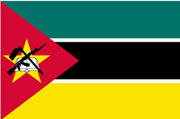Dominique Earland
 Dominique Earland is from outside of Philadelphia, PA, and attended college in Dallas, TX, at Southern Methodist University. Dominique further developed her interests in global health and malaria epidemiology as a post-baccalaureate student at the University of Maryland School of Medicine in the Laufer Lab. Currently, Dominique is a fourth-year student in the MSTP program at University of Minnesota (UMN) and a rising second-year epidemiology PhD student in the Searle Lab. Her research interests focus on Plasmodium falciparum epidemiology in Sussundenga, Mozambique, specifically health-seeking behaviors and healthcare capacity for uncomplicated malaria infections and severe malaria disease. She also seeks to understand the impact of colonization and imperialism in global health and incorporate decolonization theory into her research. Dominique is clinically interested in infectious disease medicine among women and children populations. Beyond her educational pursuits, Dominique is involved in justice, equity, diversity and inclusion advocacy and mentorship at UMN and in the greater Minneapolis community.
Dominique Earland is from outside of Philadelphia, PA, and attended college in Dallas, TX, at Southern Methodist University. Dominique further developed her interests in global health and malaria epidemiology as a post-baccalaureate student at the University of Maryland School of Medicine in the Laufer Lab. Currently, Dominique is a fourth-year student in the MSTP program at University of Minnesota (UMN) and a rising second-year epidemiology PhD student in the Searle Lab. Her research interests focus on Plasmodium falciparum epidemiology in Sussundenga, Mozambique, specifically health-seeking behaviors and healthcare capacity for uncomplicated malaria infections and severe malaria disease. She also seeks to understand the impact of colonization and imperialism in global health and incorporate decolonization theory into her research. Dominique is clinically interested in infectious disease medicine among women and children populations. Beyond her educational pursuits, Dominique is involved in justice, equity, diversity and inclusion advocacy and mentorship at UMN and in the greater Minneapolis community.

Predictors of Severe Malaria Disease: A Case Control Study in Sussundenga Mozambique
Sussundenga Rural Health Center
Mozambique
What does the Kean Fellowship mean to you?
The Kean Fellowship is an opportunity to learn beyond the existing literature and western perspectives about the impact of malaria in the community. The chance to travel and learn about malaria from local experts, healthcare workers and students in Mozambique is essential for my training and career goals. It is also very meaningful to join a community of students and scholars that value global health. The support to attend ASTMH conferences during my clinical and research training is beneficial as well. The Kean Fellowship is further developing my clinical and research interests all while expanding my professional network.
What do you anticipate learning?
I hope to learn about severe malaria case management from the perspective of healthcare administrators, nurses and the community in Sussundenga, Mozambique. I will also learn how to pilot research projects in malaria-endemic settings. The main objectives for this summer research experience are to recruit and train study staff at the Sussundenga rural health center for a severe malaria case control study. I will also work on quality assurance processes in preparation for the case control study. Lastly, I am looking forward to learning about the culture, history and language of Mozambique.
What interests you about tropical medicine and what problems are you interested in solving?
Although tropical medicine is rooted in colonialism and imperialism, I am most excited to be a part of the new path forward in tropical medicine and global health that promotes equity and decolonization. As an MD/PhD trainee, I am interested in interdisciplinary epidemiology research to investigate social and clinical factors associated with Plasmodium falciparum infection and disease. I am interested in learning how to improve health seeking, healthcare capacity and organizational policies that delay malaria control and prevention progress in high burden countries like Mozambique.